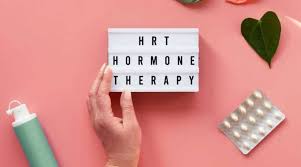Hormone replacement therapy, or HRT, is a subject that continues to gain attention among women navigating menopause and beyond. With its potential to alleviate a range of symptoms, enhance overall well-being, and improve quality of life, many women wonder if it’s the right solution for them.
This article examines the benefits of HRT, discussing its effects on menopause, bone health, mood, and sleep, while providing insight into its mechanism of action.
Can Hormone Replacement Therapy Help Manage Menopausal Symptoms?
Menopause brings significant hormonal transitions that often result in symptoms like hot flashes, night sweats, mood swings, and vaginal dryness. For many women, these changes can disrupt their daily lives. Hormone replacement therapy is designed to supplement the body with estrogen, progesterone, or a combination of both to help offset these fluctuations.
HRT can dramatically reduce the frequency and intensity of hot flashes and night sweats. It’s been shown to alleviate vaginal dryness, which can improve comfort and intimacy in relationships. For women struggling with energy fluctuations, fatigue, and irritability, HRT provides the balance needed to help restore a sense of normalcy. By regulating hormone levels, many women also report feeling more in control of their moods.
Does HRT Improve Bone Health and Reduce Osteoporosis Risk?
One notable benefit of hormone replacement therapy is its protective effect on bone health. After menopause, the decline in estrogen levels can speed up bone density loss, increasing the risk of osteoporosis. This condition makes bones weaker, more brittle, and prone to fractures, particularly in areas like the hips, spine, and wrists.
Research demonstrates that HRT can help prevent bone loss by maintaining or even improving bone density. When used early in postmenopause, HRT can effectively reduce the likelihood of osteoporotic fractures. For many women with a higher genetic predisposition to osteoporosis or those who already have mild bone-density issues, HRT can be a part of a comprehensive bone-health strategy.
It’s worth noting that preventing osteoporosis isn’t just about stronger bones. It also helps women maintain their independence as they age, reducing the risk of falls and fractures that often lead to longer-term health issues.
How Does Hormone Therapy Affect Mood and Sleep in Women?
One of the most overlooked aspects of menopause is the emotional toll it can take. Decreased hormone levels are often linked to low moods, anxiety, and even depression. Poor sleep caused by hot flashes or night sweats can further exacerbate these feelings, creating a frustrating cycle for menopausal women.
HRT can help by regulating hormonal fluctuations, which have a direct impact on serotonin levels in the brain, the neurotransmitter associated with happiness and emotional stability.
Women who undergo HRT often report feeling more emotionally balanced and less prone to mood swings. Better sleep is another powerful advantage of HRT. By reducing night sweats and hot flashes, it enables women to sleep through the night undisturbed. Adequate sleep doesn’t just improve energy levels, but it can also help women feel more resilient, capable, and upbeat in their day-to-day lives.
Consult a Specialist
Hormone replacement therapy offers numerous benefits for women seeking relief from menopausal symptoms, better bone health, and improved emotional well-being. Yet, it’s necessary to understand that HRT isn’t a one-size-fits-all solution.
Every woman’s body and medical history is unique, which is why consulting with a medical professional is key. A specialist can evaluate your symptoms, risks, and personal goals to determine if HRT is the right fit for you. Reach out to schedule a consultation today.
Related Articles
COVID-19 Safety Measures: How to Protect Yourself and Others
What to Expect During Your First Visit to a Restorative Dentist
What to Expect During Your First Appointment with a Pain Management Specialist





